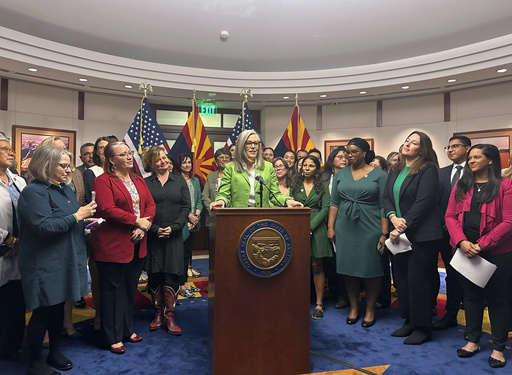
PHOENIX — Top officials in Arizona certified the state’s election results on Monday, which included voter approval of a significant measure that broadens abortion access, lifting the previous limit from 15 weeks to fetal viability.
This positive outcome for advocates of reproductive rights sets the stage for their forthcoming legal challenges against other restrictive abortion laws they believe should be overturned. Currently, the existing 15-week limit only allows for exceptions when the mother’s life is endangered.
Unless a court intervenes or there’s legislative action, these laws will continue to stand, even if they oppose the newly approved constitutional amendment. Opponents of the amendment are already preparing their defense strategies.
For the time being, healthcare providers will have the discretion to perform abortions after the 15-week mark. Arizona Attorney General Kris Mayes announced that legal challenges could arise in the coming days during a press conference celebrating expanded abortion access, stating, “The position of the state of Arizona will be that we agree that abortion is legal in our state.”
Arizona is among five states that voted in favor of ballot initiatives during the 2024 general elections which aim to incorporate the right to an abortion into their respective state constitutions. Voters in Nevada also showed support for a similar amendment, though this will require approval again in 2026 for it to be enacted. New York voters also approved a measure that prohibits discrimination based on “pregnancy outcomes.”
The issue of abortion has always played a pivotal role in U.S. politics, gaining even more prominence following the Supreme Court’s 2022 decision to overturn Roe v. Wade, enabling states to impose bans or restrictions on access. Many states governed by Republican majorities have enacted such restrictions, while abortion rights advocates have proposed alternatives through ballot measures. Earlier this year, there was a potential risk of a near-total ban on abortions in Arizona.
Chris Love, a spokesperson for Arizona for Abortion Access, expressed immense satisfaction, noting that the constitutional amendment reflects two years of tireless work. “We’re so excited to see that this is finally coming to fruition,” said Love. “It’s a lovely day.”
Cathi Herrod, president of the socially conservative Center for Arizona Policy, anticipates various legal challenges regarding existing abortion regulations and is ready to intervene as necessary.
Among the current regulations is a law mandating patients to undergo an ultrasound at least 24 hours prior to the procedure, with the option of viewing the image and receiving an explanation of its contents. Additionally, there’s a law that prohibits abortions sought solely based on diagnosed genetic anomalies.
“All the laws that have currently been on the books are under question and are subject to possible challenges at some point,” stated Darrell Hill, policy director at the American Civil Liberties Union of Arizona.
In a separate case, Planned Parenthood affiliates in Missouri quickly initiated a lawsuit following a ballot measure that passed earlier this month, aiming to invalidate current abortion bans and restrictions. However, conditions differ in that state, which has an existing absolute ban on abortions at any stage and currently has no clinics performing these procedures. A hearing for this case is slated for Dec. 4.
Earlier on the same day, Arizona Governor Katie Hobbs drew a comparison between the current election results certification and that of four years prior. She noted that the previous event was overshadowed by “raging conspiracies” that led to attempts to stop the certification nationally and resulted in the Jan. 6 insurrection. This time, she expressed gratitude that the atmosphere was different.
Arizona Secretary of State Adrian Fontes reported that during the 2024 election, voters in the state cast 3,428,011 ballots, reflecting an increase of 7,446 ballots compared to the 2020 election. The rate of participation among registered voters remained fairly steady, just below 80%. Turnout figures were documented at 79% for the 2020 election and slightly lower at 78% for the recent 2024 election.
